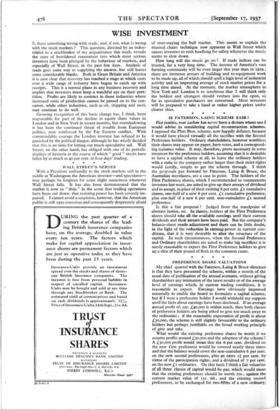LS PATERSON, LAING SCHEME FAIR?
Fiat justitia, ruat caelum has never been a dictum whose use I would advise in considering capital reconstruction schemes. I opposed the Plan Bros. scheme, now happily defunct, because it would have placed virtually all the sacrifice with the Second Preference holders. Ordinary shareholders, however worthless their shares may appear on paper, have votes, and a correspond- ing nuisance value. It may, therefore, prove necessary in some instances for the preference holders, assuming that it is desirable to have a capital scheme at all, to leave the ordinary holders with a stake in the company rather larger than their strict rights would justify, simply to get the scheme through. I think the proposals put forward by Paterson, Laing & Bruce, the Australian merchants, are a case in point. The holders of the First Preference shares, which I recommended to venturesome investors last week, are asked to give up their arrears of dividend and to accept, in place of their existing 6 per cent. Ex cumulative shares, one-half of a new 6 per cent. £i cumulative preference,
plus one-half of a new 6 per cent. non-cumulative second preference.
Is this a fair proposal ? Judged from the standpoint of abstract justice, no. In theory, holders of the First Preference shares should take all the available earnings until their current dividends and their arrears have been paid. But the company's balance-sheet needs adjustment and there can be little doubt, in the light of the reduction in earning-power in current con- ditions, that it is very desirable to alter the structure of the capital. In such circumstances, when the Second Preference and Ordinary shareholders are asked to make big sacrifices it is surely reasonable to expect the First Preference holders to give up a slice of their pound of flesh in the common cause.










































 Previous page
Previous page